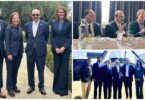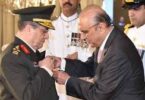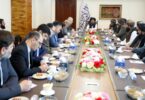F.P. Report
PESHAWAR: Deviation from constitution, and giving up on rule of law lead to the conflict and destruction of the social fabric of the society. Cultivating youth in the core constitutional values is the key recipe for social peace and harmony. Human rights education can not only help protecting ones’ own rights but also the other’s rights in the society. The government and its institutions cannot implement the laws and policies alone, without the active role and support of public. The youth ought to realize the importance of seeking knowledge in all circumstances and it has nothing to do with degrees. Rule of laws means supremacy of law, i.e. everyone is subject to law and accountability including citizens and rulers.
These were the remarks made by the speakers during the second round of Ulasi Taroon, Youth Capacity Building Workshops held at Women University Mardan, from February 24-25, 2018.
Mr. Imtiaz Gul, Executive Director, Center for Research and Security Studies (CRSS) said that the deviation from constitution, and giving up on rule of law not only led to the conflict and fragility but also destroyed the social fabric of the society. As future leaders, the youth should be considerate of the criticality of the core constitutional values as a recipe for social peace and harmony in the society.
“Human rights education is critical for any society to not only prevent but also preempt the violation of law and conflict. We need to believe in the social values and abide by social contract to create respect for others”, he said. “We believe that only by sticking to the constitution, by promoting respect for the universal declaration of human rights, and by creating awareness on the UN indicators for rule of law and equal citizenry can we help rationalize the conversation on governance, national unity, peace and harmony. For this critical thinking is the first tool, to create a critical human mass that could potentially serve as the harbinger of critical thinking and thus contribute to the goal of peace and social harmony”, He noted.
Mr. Imtiaz Gul added that unfortunately, the element of critical thinking was largely missing in our society. The capacity building workshops as part of Ulasi Taroon initiative are an attempt to sensitize young future leaders on the need for critical thinking, for judging life and thoughts of others with respect and tolerance. Building critical thinking and processing of information skills will help them dissect and analyze issues effectively.
Ms. Shagufta Khalique, Educationist said that men and women; both are born with equal rights. They have equal rights according the constitution and universal declaration of human rights. They are considered equal by every religion of the world. Human rights education can not only help protecting ones’ own rights but also the other’s rights in the society. The corruption of money is not the only challenge posing Pakistan but also the corruption of time, roles and responsibilities.
Ms. Amna Sardar, Member of KP Assembly and Secretary Women Parliamentary Caucus said that the women were doing exceptionally well in all walks of life and they were hoped to elevate to more prominent positions in the future. The government and its institutions cannot implement the laws and policies alone, without the active role and support of public. The citizens’ consideration to cast vote should not be family association, gender, colour, cast or creed, it should be the true representation of issues of public concern. You cannot expect a corruption free society without holding yourself accountable first. The youth ought to realize the importance of seeking knowledge in all circumstances and it has nothing to do with degrees. For this, they need to be regular readers, critical thinkers and observers. It’s extremely critical to sensitize and cultivate the future leaders in the ideals of democracy, governance and accountability given their opinion multiplication roles in the future. The youth should also be aware of the roles and responsibilities of elected representatives to hold them accountable towards the public. The ignorance of citizens about their constitutional rights creates space for their exploitation. The national interest should be paramount to the personal interest during legislation. The independent and impartial adjudication of crimes and flouting of law is absolutely critical to ensure rule of law in the society.
Barrister Ali Gohar said that mother of all laws in the country was constitution and every other law had to follow; supplement and be in synch with the mother law. It’s the basic skeleton/ structure of all other laws in the country. Any law, policy or legislation cannot be against the constitution of the country. Rule of laws means supremacy of law, i.e. everyone is subject to law and accountability including citizens and rulers. The law applies on everyone equally and indiscriminately and no one is above law. Rule of law refers to a society where judiciary, legislature and executive only commit to impartial and effective adjudication, legislation and execution respectively. The fundamental human rights of the citizens are clearly enshrined in the constitution. The unavailability of citizens’ due rights in any specific part of the country is contrary to the concept of rule of law. We must understand that if violation of law is not responded once, we should expect several more violations in the future. Equal implementation of law is also critical to foster and strengthen social cohesion and fabric respectively. Every law not only brings rights but also the duties to fulfill.
Ulasi Taroon is a counter radicalization initiative of Center for Research and Security Studies that aims to address the radicalization challenges, extremist ideologies and foster social cohesion through a discourse anchored in the core constitutional values which are fundamentally essential prerequisites for social peace and harmony. The endeavor aims to cultivate and sensitize the youth – in the universities across KP and FATA – in the core values in the Pakistani constitution and our social contract. It’s an attempt to highlight the criticality of abiding by these ideals – such as adherence to rule of law, primacy and sanctity of constitution, equal citizenry, responsible citizenship, respect for fundamental human rights, tolerance for diversity and different opinions, inclusive democracy and good governance – as a measure of fostering social cohesion and peaceful co-existence.






